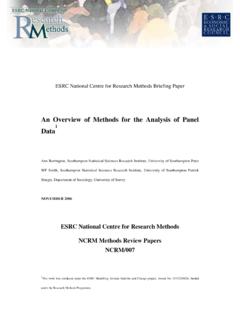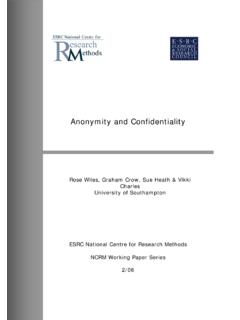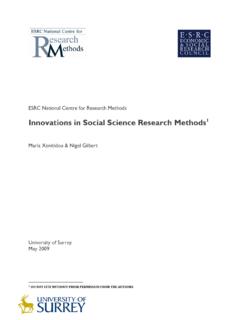Transcription of How many qualitative interviews is enough? - NCRM
1 National Centre for Research Methods Review Paper How many qualitative interviews is enough ? Expert voices and early career reflections on sampling and cases in qualitative research Sarah Elsie Baker, Middlesex University Rosalind Edwards, NCRM, University of Southampton 1 How many qualitative interviews is enough ? Contents Abstract 2 Introduction by Sarah Elsie Baker and Rosalind Edwards 3 Expert voices 7 Patricia and Peter Adler Les Back Howard S. Becker Julia Brannen Alan Bryman Kathy Charmaz Norman Denzin Andrea Doucet Uwe Flick Jennifer Mason Daniel Miller Luisa Passerini Charles C. Ragin Paul ten Have Early career reflections 37 Ben Baumberg Mark Doidge Tracey Jensen Linda Sandino Bindi Shah Conclusion 43 2 Abstract Students conducting a piece of qualitative research frequently ask how many interviews is enough ? Early career researchers and established academics also consider this question when designing research projects.
2 In this NCRM Methods Review paper we gather and review responses to the question of how many from 14 renowned social scientists and 5 early career researchers. The riposte to the question of how many from most contributors is it depends . In considering what it depends upon however, the responses offer guidance on the epistemological, methodological and practical issues to take into account when conducting research projects. This includes advice about assessing research aims and objectives, validity within epistemic communities and available time and resources. 3 Introduction Sarah Elsie Baker, Middlesex University and Rosalind Edwards, University of Southampton This NCRM Methods Review paper provides a series of brief but valuable answers, from seasoned methodologists and early career researchers, to the thorny question of how many interviews are enough ? in conducting a piece of qualitative research. Our intention is to provide a resource for undergraduate and postgraduate social science students undertaking their own research projects, and for lecturers teaching research methods and/or supervising student dissertations or theses.
3 Later career researchers may also find the contributions give them alternative perspectives to their usual practice. We were moved to put the paper together because we have lost count of the number of times students have asked us the question of how many interviews they should do when they are conducting a piece of qualitative empirical research for their dissertation or thesis. We may even have pondered the dilemma ourselves in writing grant proposals for research funding. The issue of how many is also a recurrent discussion thread in different guises on methods forums, such as , and Surprisingly there is a paucity of explicit discussion of this basic issue for qualitative researchers in general student text books. Where it is addressed, the issue may be buried away in chapters concerned with other topics. Is there a formula or way of calculating how many ? Or is how many even an appropriate question for qualitative research?
4 Is i t appropriate epistemologically does it depend on your theoretical perspective, academic discipline, or the social population or group or context that you are researching? Is it appropriate practically does it depend on the time and resources that you have available, who is funding or supervising your research, or upgrade review board and research ethics committee requirements? To help in teasing out answers to these questions, in the first part of this Methods Review we draw on the tacit knowledge of a series of renowned social scientists who come from a range of epistemological and disciplinary positions but who share an expertise in qualitative research. Most readers will recognize their names as authors of influential methods books and articles. The prominent methodologists we approached rarely turned down our request, and we very much appreciate their willingness to contribute to this resource despite their overcommitted writing schedules.
5 We asked each contributor to provide a short, to-the- point, piece responding to the key question: What advice would you give a student who asked you how many interviews they should carry out for their qualitative research project? We refer to the series of pieces in the first part of this paper as our expert vo ices because each of them is written in the style preferred by the particular author/s. Beyond putting the key how many question to them we did not stipulate any format. Thus these contributions range from informal direct addresses to a more formal, referenced approach. One of the pioneering qualitative researchers who we approached, Harry Wolcott, unfortunately was unable to send us an extended discussion, but provided a short answer to how many ? in the body of his email: That is, of course, a perennial question if not a great one. The answer, as with all things qualitative , is it depends. It depends on your resources, how important the question is to the research, and even to how many respondents are enough to satisfy committee members for a dissertation.
6 For many qualitative studies one respondent is all you need your person of interest. But in general the old 4 rule seems to hold that you keep asking as long as you are getting different answers, and that is a reminder that with our little samples we can t establish frequencies but we should be able to find the RANGE of responses. Whatever the way the question is handled, the best answer is to report fully how it was resolved. After this call for transparency, Harry then proceeded to turn the intellectual tables on us, to ask How many answers did you decide were enough ? With a sudden start, we realized that, effectively, we were in the process of depending on your stance gathering a sample of experts or selecting cases. Indeed, the emailed responses to our question that we received could be conceived of as a form of interview conducted with these experts. Harry s perceptive riposte deserved consideration, so we elaborated our rather instinctive procedure; a list of people, disciplines and institutional affiliations scribbled hastily on a piece of paper when we conceived the idea.
7 We replied to Harry that we were working with an estimate of reaching data saturation, selecting on the basis of discipline, philosophy, substantive topic expertise and geographical locality, as well as the practicalities of space. Do try to supply the answer to how many respondents you sought for the question you asked urged Harry in response, and we replied: The answer is 15 . In the event, however, the quota of expert voices ended up at 14. In the second part of the paper we include some briefer contributions from early career researchers on the specific ways that they approached and handled the question of how many qualitative interviews is enough ? in particular projects. As with the experts, these pieces are from people rooted in different social science disciplines, albeit all drawn from the UK rather than internationally. We have termed the pieces reflections since they represent considerations from people who have faced the dilemma of how many without the resource of established reputation to rely on, and survived.
8 The focus on completing specific projects means that many of the pieces document how sampling methodologies and methods change in line with practical considerations. In the process of finding academics with emerging rather than established careers we, like the early career researchers, also had to consider the practicalities of identifying and selecting respondents. Ultimately we relied on our own established networks and connections as well as groups such as the British Sociological Association Early Careers Forum. This has resulted in five contributions that draw upon a range of different experiences and are written from different methodological perspectives. Whether or not we have reached saturation of possible responses to the question of how many qualitative interviews is enough ? with our overall number of contributions that is, 19 is a moot point. But what we do have, we believe, is an excellent range of high quality pieces of advice that will serve as a valuable guide for qualitative researchers whatever their range of experience.
9 Advice T hemes The question of How many is not exclusive to qualitative research, though its particular implications are. In their responses a number of contributors begin by reflecting on the differences between quantitative and qualitative approaches to the question. Patricia and Peter Adler start their piece by framing these differences in terms of research objectives. They contrast quantitative methods that objectively use correlations to describe and understand what people do , with qualitative approaches that attempt to generate a subjective understanding of how and why people perceive, reflect, role-take, interpret, and interact . They suggest that this difference in emphasis changes how research is undertaken and in what ways the question of how many is approached. Adler and Adler write that quantitative researchers usually have an idea of how many cases they will need in order to test their hypotheses at the beginning of a project.
10 In contrast because 5 qualitative research is exploratory by nature, qualitative researchers may not know how much data to gather in advance. Charles Ragin also considers the specificities of qualitative research in his response. He compares a quantitative emphasis on statistical validity with a qualitative approach interested in the the core features of cases sharing a category or an outcome . Ragin uses the example of a project based on the observation that all street vendors in a city are immigrants. A qualitative approach, he suggests, would usually be interested in identifying commonalities between types and then drawing out the implications of these commonalities to the larger whole. In the case of street vendors, the project might consider their activities in relation to other immigrants, as well as the implications for a city s political economy. The emphasis on commonality, Ragin suggests, means that once a qualitative researcher is conducting their research they may find that that the evidence is so repetitive that there is no need to continue.








